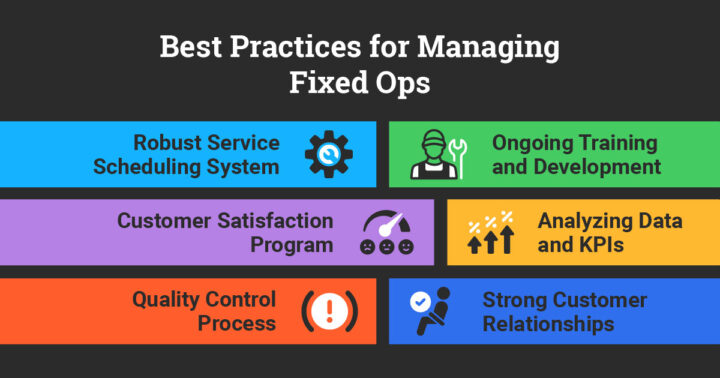Within a dealership’s operations, both fixed and variable ops play critical roles in profitability and business success. However, understanding the distinction between these two segments is essential for dealership owners, managers, and fixed operations consultants looking to optimize costs, enhance efficiency, improve profitability, and elevate the customer experience. This blog will explore their differences, highlight their contributions, and provide insights into their significance.
At the heart of dealership success lies the ability to maximize Fixed Ops Profitability — a crucial element heavily influenced by understanding both fixed ops and variable ops.
Understanding Dealership Operations
Dealership operations, like many other businesses, involve the coordination of various departments to ensure smooth functions. These departments include new and used vehicle inventories, finance and insurance, service, and parts departments. Understanding dealership operations is crucial for identifying key opportunities for improvement and optimizing business performance. Dealership operations also involve managing the flow of vehicles, customers, and financial transactions.
What is the Difference Between Fixed Ops and Variable Ops?

Fixed ops (short for fixed operations) and variable ops refer to two distinct branches of dealership operations.
Variable operations refer to the revenue streams generated by selling vehicles. This includes both new and used car sales. The term “variable” stems from the fact that vehicle sales often fluctuate with market demand, economic conditions, and dealership strategies. This means profits from variable operations can be inconsistent.
On the other hand, fixed ops centers on predictable, recurring income generated by service departments, parts sales, and collision repairs. These business areas provide a steady source of revenue regardless of wider market conditions. The “fixed” aspect refers to having a consistent operational structure focus continues to serve customers post-sale.
Dealership profitability often relies on striking the right balance between these two operational areas. While variable ops drive initial sales and customer entries, fixed ops ensure ongoing revenue and customer loyalty. A successful general manager typically has experience from the variable ops side, but recognizes the significance of fixed ops, ensuring both areas work together to enhance customer satisfaction and drive dealership success.
What is Fixed Ops in a Dealership?
Fixed operations are the backbone of a dealership’s long-term success. These include all the profit-generating services provided after a vehicle is sold, such as maintenance, repairs, and parts replacement.
Dealers face numerous challenges, including declining profit margins due to economic pressures such as inflation and increased operational costs.
What are fixed operations, specifically?
- Service Department: Handling maintenance services like oil changes, tire rotations, and more complex repairs.
- Parts Department: Selling parts and accessories both through the service department and directly to customers.
- Collision Department: Managing bodywork and repair for vehicles involved in accidents.
Notably, fixed ops lays a reliable base for revenue, with statistics showing that service and parts can account for over half of a dealership’s total gross profit in many cases. And as car buyers retain their vehicles longer, the importance of optimizing service lanes continually grows, helping stabilize profit margins.
What are Fixed Ops in Automotive?
What is fixed ops within the automotive industry, and why is it so critical? Beyond simply being a section of dealership operations, fixed ops helps establish a dealership as a trusted brand within its community. This department keeps customers engaged after purchase and fosters loyalty for future vehicle purchases. A positive customer experience in fixed ops can significantly enhance customer retention and loyalty.
Key benefits of fixed ops in automotive include the following:
- Customer Retention: Repeat visits for vehicle servicing keep your dealership top of mind for customers.
- Steady Revenue: Unlike vehicle sales, service and repair needs remain constant regardless of market fluctuations.
- Value-Added Propositions: Fixed ops presents up-selling opportunities, from providing necessary parts upgrades to product add-ons.
Investing in fixed ops creates a win-win scenario. Customers get reliable maintenance and repairs, while dealerships enjoy steady income from loyal patrons.
What are Fixed Operations Within a Car Dealership?
When considering fixed operations within a car dealership, the unique interplay between variable operations and fixed operations becomes clear. While variables—like vehicle prices and sales strategies—impact a dealership’s ability to move inventory, fixed operations provide a consistent remedy to financial disruptions like recessions or seasonal sales dips.
A general manager plays a crucial role in ensuring that both fixed and variable operations work seamlessly to drive dealership success.
For instance, variable operations dealership profit hinges on high-volume car sales and maintaining competitive pricing strategies. On the flip side, fixed operations must focus on:
- Maximizing Efficiency: Ensuring customer pay (CP) jobs are completed promptly to encourage repeat visits.
- Revenue Opportunities: Identifying hidden revenue leaks in pricing issues or untrained service advisors.
- Long-Term Stability: Developing systems for up-selling services, additional warranties, and upgrades for parts over time.
The symbiotic connection between variable and fixed ops ensures holistic dealership growth. Understanding and optimizing fixed operations leads to long-term stability, while variable ops remain exposed to the market’s ebbs and flows.
The Role of a Fixed Ops Manager

A fixed ops manager plays a crucial role in overseeing the fixed operations department, which includes the service, parts, and collision center departments. The fixed ops manager is responsible for ensuring that the department operates efficiently and that customers are satisfied with the service they receive.
Key responsibilities of a fixed ops manager include:
- Creating and managing budgets
- Hiring and training employees
- Overseeing scheduling
- Onsuring the department is compliant with regulations
A successful fixed ops manager must have strong leadership and communication skills, as well as the ability to analyze data and make informed decisions.
Variable Operations: Sales and Revenue
Variable operations, also known as front-end operations, refer to the departments that deal with selling vehicles to customers. These departments include sales, finance, and marketing. The primary goal of variable operations is to generate revenue by selling vehicles, and the success of these departments is critical to the dealership’s profitability. Variable operations must be managed effectively to ensure that sales targets are met and customer satisfaction is maintained. This includes implementing effective sales strategies, managing inventory levels, and providing excellent customer service.
Why Investing in a Strong Fixed Ops Strategy Matters
To enhance dealership operations, addressing internal inefficiencies, such as inaccurate pricing, insufficiently trained staff, and missed data insights, is crucial. Dealers face mounting challenges, including shrinking profit margins and rising operational costs, making it essential to adopt innovative tools and strategies. By tackling these issues head-on, dealerships can drive greater efficiency and maintain profitability in an increasingly competitive market.
Working with solutions like Dynatron Software can be instrumental. Dynatron makes running fixed operations easier and more profitable through technologies like PriceSmart, which focuses on optimizing pricing, maximizing effective labor rates (ELR), and improving performance in service departments. Dealerships that leverage Dynatron often see significant ROI, averaging $250K in increased revenue within their first year.
By bolstering fixed operations, dealerships not only increase profitability but also build stronger customer relationships, ensuring loyalty and service continuity.
Key Performance Indicators (KPIs) for Fixed Ops
Key performance indicators (KPIs) are used to measure the performance of the fixed operations department and identify areas for improvement.
KPIs for fixed operations departments include:
- Service order efficiency
- Repair order writing
- Technician productivity
- Pricing compliance
By tracking these KPIs, fixed ops managers can identify trends and patterns in the department’s performance and make data-driven decisions to optimize operations. A dedicated Fixed Ops solution like Dynatron Software can help dealerships monitor KPIs in comprehensive, easy-to-use dashboards.
Best Practices for Managing Fixed Ops

Managing fixed operations effectively requires strategic planning, effective communication, and data-driven decision-making.
Best practices for managing fixed ops include:
- Implementing a robust service scheduling system to minimize delays and maximize technician productivity
- Providing ongoing training and development opportunities for technicians and service advisors
- Implementing a customer satisfaction program to ensure that customers are satisfied with the service they receive
- Analyzing data and KPIs to identify trends and patterns in the department’s performance
- Implementing a quality control process to ensure that work is completed to a high standard
- Building strong relationships with customers to increase loyalty and retention
By following these best practices, fixed ops managers can optimize the performance of the fixed operations department and contribute to the dealership’s success.
Schedule a Demo with Dynatron
Understanding the differences between fixed and variable ops is the first step toward driving dealership success. Dynatron Software is here to help you optimize your service department.
At Dynatron, our data-driven tools and expert coaching solutions enable dealerships to uncover hidden opportunities and boost profitability in fixed operations. Contact us today to schedule a demo and learn how Dynatron can transform your dealership operations.